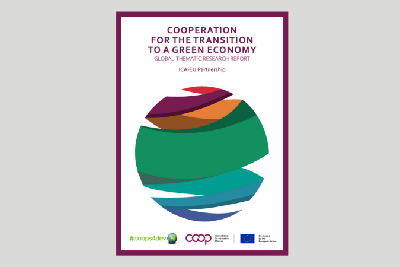 A new research report published by #coops4dev last week provides an overview of how cooperatives are innovating to protect the environment, as well as mitigate and adapt to the impacts of climate change. Called “Cooperation for the Transition to a Green Economy,” the report is co-produced by all International Cooperative Alliance global and regional offices within the framework of the ICA-European Union Partnership.
A new research report published by #coops4dev last week provides an overview of how cooperatives are innovating to protect the environment, as well as mitigate and adapt to the impacts of climate change. Called “Cooperation for the Transition to a Green Economy,” the report is co-produced by all International Cooperative Alliance global and regional offices within the framework of the ICA-European Union Partnership.
With a focus on co-ops put the 7th Cooperative Principle, “concern for community,” into action, the report covers eight case studies from all ICA regions and showcases a variety of environmental actions taken by co-op enterprises. Examples include the management of natural habitats and resources through cooperative approaches, innovative ways to minimize the environmental impacts of climate change, and best practices from ICA members. It features cooperatives of varying sizes and sectors, specifically in the energy, forestry, housing, transportation and finance sectors.
“Illustrating how the cooperative movement as a model of ecological equilibrium incorporates the values of cooperation, solidarity, self-management and democracy in planet-centered development approaches, this research contributes to developing holistic policies and institutions to achieve economic, social and environmental objectives,” said Ilcheong Yi, Senior Research Coordinator of the United Nations Research Institute for Social Development “I recommend it as a must-read for those searching for a realistic means of sustainable development in 2021 and beyond.”
The report demonstrates that cooperatives contribute to sustainable practices in a variety of ways, including by producing and distributing renewable energy, and through cooperative education and training on the environment. Overall, the cooperative business model can be a viable alternative to business as usual and is set to become a preferred model for tackling climate change and environmental degradation.
The publication also focuses on cooperative contributions to the UN Sustainable Development Goals (SDGs), including SDG 13 on climate action and SDG 7 on clean and renewable energy. It suggests there is a clear need for meaningful action and places a clear emphasis on the necessity of systemic economic and social change to rise to the climate challenge. This perspective is amplified against a new backdrop of insecurity and urgency since the onset of the COVID-19 pandemic, alongside the recent assessments of the Intergovernmental Panel on Climate Change (IPCC).


